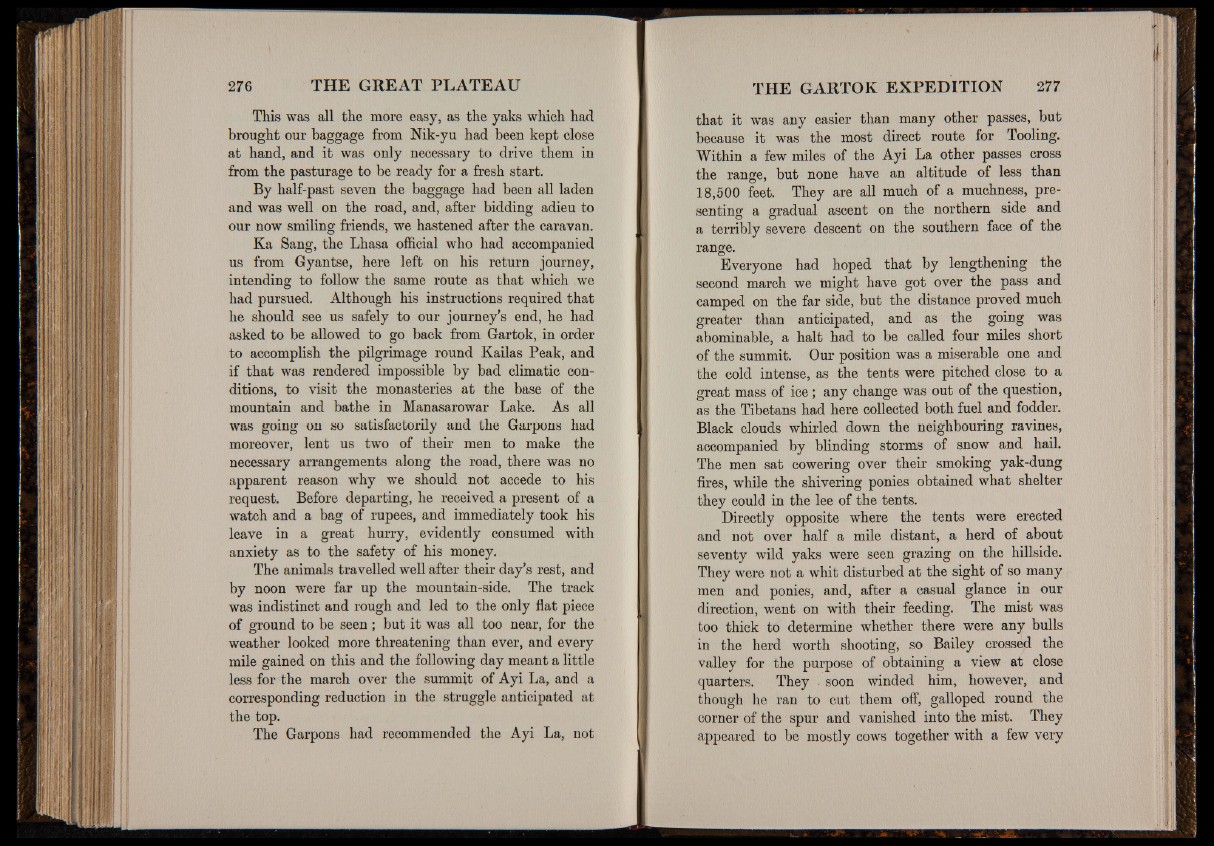
This was all the more easy, as the yaks which had
brought our baggage from Nik-yu had been kept close
at hand, and it was only necessary to drive them in
from the pasturage to be ready for a fresh start.
By half-past seven the baggage had been all laden
and was well on the road, and, after bidding adieu to
our now smiling friends, we hastened after the caravan.
Ka Sang, the Lhasa official who had accompanied
us from Gyantse, here left on his return journey,
intending to follow the same route as that which we
had pursued. Although his instructions required that
he should see us safely to our journey’s end, he had
asked to be allowed to go back from Gartok, in order
to accomplish the pilgrimage round Kailas Peak, and
if that was rendered impossible by bad climatic conditions,
to visit the monasteries at the base of the
mountain and bathe in Manasarowar Lake. As all
was going on so satisfactorily and the Garpons had
moreover, lent us two of their men to make the
necessary arrangements along the road, there was no
apparent reason why we should not accede to his
request. Before departing, he received a present of a
watch and a bag of rupees, and immediately took his
leave in a great hurry, evidently consumed with
anxiety as to the safety of his money.
The animals travelled well after their day’s rest, and
by noon were far up the mountain-side. The track
was indistinct and rough and led to the only flat piece
of ground to be seen; but it was all too near, for the
weather looked more threatening than ever, and every
mile gained on this and the following day meant a little
less for the march over the summit of Ayi La, and a
corresponding reduction in the struggle anticipated at
the top.
The Garpons had recommended the Ayi La, not
that it was any easier than many other passes, but
because it was the most direct route for Tooling.
Within a few miles of the Ayi La other passes cross
the range, but none have an altitude of less than
18,500 feet. They are all much of a muchness, presenting
a gradual ascent on the northern side and
a terribly severe descent on the southern face of the
range.
Everyone had hoped that by lengthening the
second march we might have got over the pass and
camped on the far side, but the distance proved much
greater than anticipated, and as the going was
abominable, a halt had to be called four miles short
of the summit. Our position was a miserable one and
the cold intense, as the tents were pitched close to a
great mass of ice ; any change was out of the question,
as the Tibetans had here collected both fuel and fodder.
Black clouds whirled down the neighbouring ravines,
accompanied by blinding storms of snow and hail.
The men sat cowering over their smoking yak-dung
fires, while the shivering ponies obtained what shelter
they could in the lee of the tents.
Directly opposite where the tents were erected
and not over half a mile distant, a herd of about
seventy wild yaks were seen grazing on the hillside.
They were not a whit disturbed at the sight of so many
men and ponies, and, after a casual glance in our
direction, went on with their feeding. The mist was
too thick to determine whether there were any bulls
in the herd worth shooting, so Bailey crossed the
valley for the purpose of obtaining a view at close
quarters. They . soon winded him, however, and
though he ran to cut them off, galloped round the
corner of the spur and vanished into the mist. They
appeared to be mostly cows together with a few very